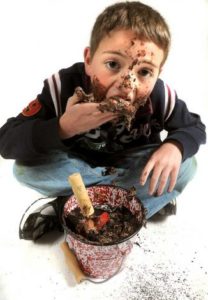
The hippocampus is a brain region that is essential for memory, learning, and other purposes. The mechanisms of how iron deficiency affects behavior include affecting the hippocampus, the corpus striatum, and certain neurotransmitters. The affected behaviors in adults include anxiety, depression, higher complex cogitative tasks, and other psychological disorders. The behaviors that are particularly often seen in infants and children include wariness and hesitance, lack of positive affect, and diminished social engagement. Some behaviors can start in childhood but persist throughout adulthood. The behavioral effects of iron deficiency can present themselves in infancy, but they are also found in adulthood. Iron deficiency anemia caused by severe iron deficiency in infancy is associated with poor health and severe neurological impairment such as mental, motor, social, emotional, neurophysiological, and neurocognitive dysfunction. She learned to use alternative coping mechanisms to deal with her psychosocial stressors. She was managed with venlafaxine 187.5 mg/day and cognitive behavior psychotherapy (identifying her cognitive errors, generating alternative thoughts, problem solving, activity scheduling and mastery, and pleasure technique) with which her depressive symptoms improved and her pagophagia reduced significantly but did not subside completely. The preoccupation with consumption of ice was associated with significant psychosocial dysfunction and interpersonal problems with the spouse. These symptoms were related to low mood and stress. Initially she would consume about 250-500 g of ice cubes per day, but gradually the quantity of consumption of ice increased to about 10-12 kg of ice cubes per day. A 44-year-old female suffering from depressive disorder since the age of 33 years presented with symptoms of an intense desire to eat ice cubes that she was unable to resist and would feel better only after consumption of ice cubes or iced drinks.

In this case report, we present the association of pagophagia with sadness in a patient with recurrent depressive disorder. Very few case reports have reported association of eating ice cubes with compulsive behavior or depressive disorders. It is usually associated with iron deficiency anemia or mental abnormalities like intellectual disabilities, autism, etc. Pagophagia (compulsive ice chewing) is a particular form of pica that is characterized by ingestion of ice, freezer frost, or iced drinks. "Pica" is the term used to describe craving for non-food and non-nutritive items like dirt, chalk, or paper.


 0 kommentar(er)
0 kommentar(er)
